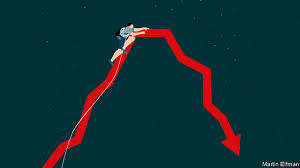People are including pets in their financial plans

ONE of Dianne Burns’ most important retirement plans involved a dapple-grey horse named Scout. The former forensic scientist had dreamed of riding once she stopped work. So it was a happy coincidence when she discovered that her financial planner—who advises clients on California’s central coast—loved horses, too. Thanks to precise financial modelling and strict budgeting, Ms Burns managed to set aside $ 20,000 for a pickup truck and $ 10,000 to buy Scout in 2016. Ms Burns says she plans to sell some shares next year so that she can buy her horse a trailer—though she hopes not to draw down her savings too much.
Ms Burns joins a growing number of people who are including their pets in their financial plans. Two-thirds of all horse-owners in America have made some provision in their wills for their pets, according to a survey by the American Pet Products Association. Over a third of American pet-owners say they would pay for animal-related expenses by putting less into their retirement accounts. And three-quarters of those buying a home said they would turn down an otherwise ideal property if it did not meet their animal’s needs.
Urbanisation helps to explain the changing relationship between humans and their pets. As people flocked to cities, they started to anthropomorphise their animals, explains James Serpell from the University of Pennsylvania’s school of veterinary medicine. Demography may also play a part. Millennials—who are putting off child-rearing—are now the largest group of pet-owners in America. But whatever the reason, pets are increasingly considered members of the family.
This change entails greater costs. Pet-product companies now make pricey hypoallergenic feed for geriatric dogs, cat food made with mackerel and lamb from New Zealand, and even antioxidant supplements for horses. David Church of Britain’s Royal Veterinary College says that procedures for animals such as brain surgery, pituitary-gland removal and heart-valve-replacement surgery show that vets can now do just about anything that doctors can for humans. For a big group of pet-owners, he says, the demand for veterinary treatment is essentially inelastic to changes in prices. Better pet health-care has in turn led to longer—and dearer—lives.
The legal framework is also becoming more supportive. As a general principle, beneficiaries of non-charitable trusts need to be humans. Pets, however, are regarded as property, and people are not typically allowed to bequeath property to other property—leaving a dishwasher to the sink, say. But pets are an exception when it comes to trusts, says Brian Sloan, who lectures on family law at the University of Cambridge. Precedent in several common-law jurisdictions makes exceptions for those set up for the maintenance of animals. Ms Burns is considering one for Scout.
This article appeared in the Finance and economics section of the print edition under the headline “Pet provisions”





